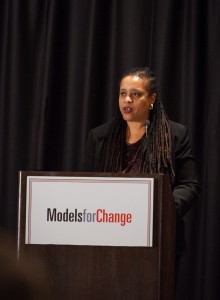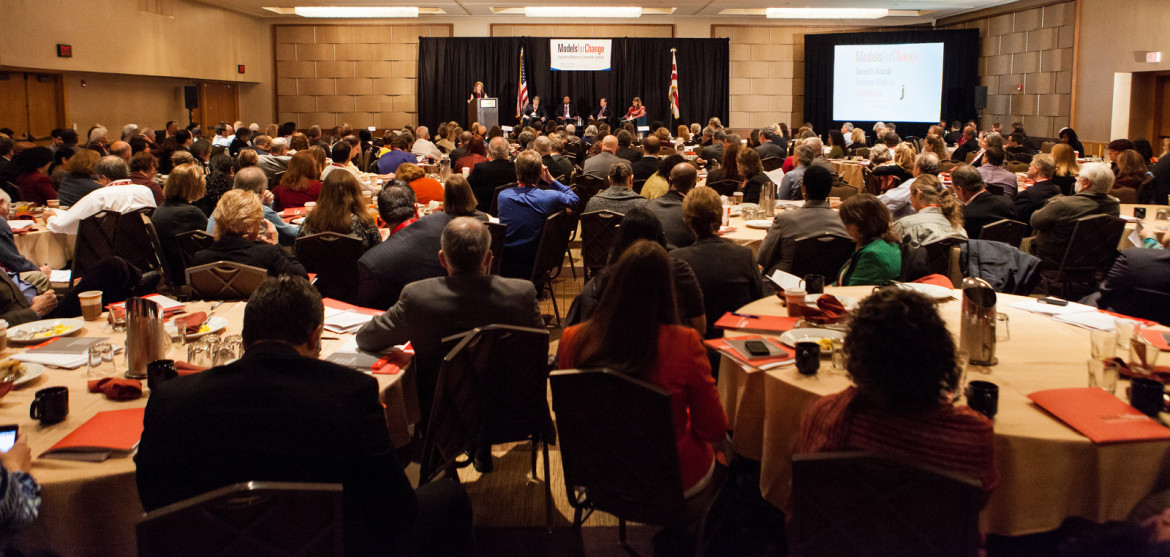
Models for Change 2012 Annual Conference
WASHINGTON, D.C. – The nonprofit MacArthur Foundation has spent more than $100 million since 2004 on developing blueprints for reform within the juvenile justice systems of 16 states. Earlier this week, its reform initiative, Models for Change, brought together nearly 400 judges, advocates, probation officers and other juvenile justice professionals for two days of workshops in Washington, D.C.
It was the seventh such yearly gathering for Models for Change partners, and it came at a time when the foundation is beginning to wind down funding for new research into juvenile justice reforms and enter a new phase focused on defining, sustaining and disseminating to the rest of the country the reform models its state partners and networks have already developed.
As the foundation moves toward solidifying the legacy of its blueprint initiative, its conference this year emphasized the power of storytelling and collaboration as a way to convey the impact of justice reforms to other states and to the public.
The storytelling theme ran through several events over the two-day event. Public relations professionals held a plenary session to discuss how juvenile justice organizations could craft an effective public message.
University of California at Santa Barbara professor Richard Ross exhibited a collection

Keynote speaker Cheryl Corley of NPR.
of photographs that illustrated the stark conditions within juvenile facilities around the country. Journalists from the Juvenile Justice Information Exchange and CBS This Morning held a hands-on workshop to explain how justice professionals could engage the media without compromising the privacy of minors. And NPR reporter Cheryl Corley gave a keynote address explaining how she came to report a radio series on juvenile offenders in Chicago last year.
More than a dozen people sat down to record short videos of their experiences within the juvenile justice system at a video booth. The videos are up on the JJIE website.
Another conference theme emerged around fostering collaboration: training attendees to recognize the multiple ways individuals, agencies and local governments can work together to improve the treatment of children in the justice system. Workshops addressed ways to involve families of juvenile offenders more closely with their child’s treatment; encourage state agencies to seek common goals with watchdog organizations; get court and child welfare agencies to share data more effectively; and build relationships between public defender offices and local law schools.
Plenary speakers encouraged cash-strapped public entities to partner with private organizations and foundations as a way to grow their resources and further their reach in replicating and sustaining reform models throughout the country.
Collaborative efforts by private foundations like MacArthur are motivating the federal Office of Juvenile Justice and Delinquency Prevention to develop its own partnerships with private philanthropic entities, said Marlene Beckman, the counsel to the assistant attorney general at the Office of Justice Programs in the U.S. Department of Justice, at a conference panel.
Federal officials recently met with a group of philanthropic organizations to solicit guidance on how to work with the private sector, Beckman said. The Obama administration was very interested in such partnerships, she said.

Julia Stasch, VP, MacArthur Foundation and Marlene Beckman, Counsel to Assistant Attorney General, Office of Justice Programs, U.S. Department of Justice.
Among the feedback the federal juvenile justice office received from philanthropic groups at that meeting was that federal agencies needed to collaborate more closely with each other – between the departments of Housing and Urban Development, Education, Health and Human Services, for example – and present a united leadership front when seeking partners from the private sector, Beckman said.
The group also advised the federal office of juvenile justice that it needed to communicate more effectively with private partners so that everyone understands their priorities and goals, and shares a vision for desired outcomes, Beckman said.
“Up until now, we have been more the follower than the leader,” Beckman said of the federal office’s role in developing public-private partnerships in pursuit of justice reforms.
Editor's note: The MacArthur Foundation supports the work of JJIE.
Photos courtesy of Models for Change.
